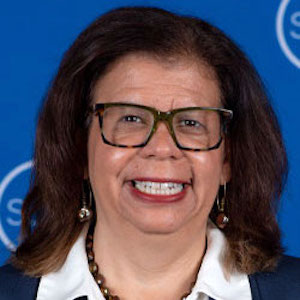The SUNY Online Summit is an annual event and gathering of the SUNY Online Teaching community of practice. This event took place as a face-to-face event at the DoubleTree Hotel, Syracuse, NY (March 8-10, 2023), and as a live virtual event. The event was recorded, no guarantees are made regarding quality of recordings. Materials and resources were collected from the presenters, and are provided as is. Times listed were approximate and ET.
DAY 1: Wednesday, March 8, 2023
9:00AM – 10:00AM Registration and Continental Breakfast
10:00AM Welcome! – Alexandra M. Pickett
10:00AM – 11:30AM
Opening Remarks
Special Guest SUNY Provost-in-Charge Shadi Shahedipour-Sandvik
Presentation
SUNY/SUNY Online Update
Kim Scalzo, Interim Senior Associate Provost, SUNY Digital Innovation and Academic Services (DIAS)
Dan Feinberg, Interim Director, SUNY Online
Track: Plenary
11:30AM – 12:30PM
Panel: Investigating Videoconference Tools for HyFlex Courses
Moderator: Chris Price, SUNY CPD
View Panelists
Tracks: Online Faculty, Online Admin/Leadership, Online Instructional Designers
12:30PM -1:30PM LUNCH (open networking opportunity)
1:30PM – 2:30PM
Panel: Effective Online Practices Awards and Showcase
Moderator: Erin Maney, SUNY Online Communications & Community Engagement Manager.
Track: Plenary
2:30PM – 3:30PM
Panel: Using AI to improve online learner writing and online instructor effectiveness
Panel Moderator: Dan Feinberg, Interim Director, SUNY Online
View Panelists
Tracks: Online Instructional Designers, Online Faculty
3:30PM – 3:45PM BREAK
3:45PM – 5:15PM
ChatGPT Workshop: A Hands-on Guide to AI Challenges and Opportunities
Daniel Stanford, Faculty Development and Instructional Technology Consultant
Tracks: Online Instructional Designers, Online Faculty, Online Admin/Leadership
5:15PM – 6:15PM
Update on Migration to the New DLE
Harry Cargile, Director of Academic Technology Strategy and Integration, SUNY Online.
Tracks: Online Instructional Designers, Online Admin/Leadership
6:15PM Wrap-up, Survey, and Preview of Day 2.
DINNER on your own. Open networking opportunities.
DAY 2: Thursday, March 9, 2023
8:00AM – 9:00AM Registration and Continental Breakfast
9:00AM – 9:15AM Welcome & Introductions! – Alexandra M. Pickett
9:15AM – 10:15AM
The Seven Principles of Blended Learning
Norman Vaughan, Ph.D., Professor in the Department of Education at Mount Royal University in Calgary, Alberta, Canada.
Tracks: Online Instructional Designers, Online Faculty
10:15AM – 11:15AM
Scaling Techniques for Asynchronous Online Courses
Robert Stephan, PhD, Associate Professor of Practice, Department of Religious Studies and Classics, College of Humanities, University of Arizona
Tracks: Online Faculty, Online Instructional Designers, Online Admin/Leadership
11:15AM – 11:30AM BREAK
11:30AM – 12:30PM
Panel: Online Students
Co-Moderators:
-
- Dr. Michele Forte, Manager of Student Supports,SUNY Online, and is an Associate Professor and Mentor in Community and Human Services at SUNY Empire State College. Kiara Williams, Program Manager of the Braven Leadership and Career Accelerator @ The City College of New York (CCNY), Georgia State University Class of 2021 and Every Learner Everywhere Inaugural Student Fellow.
View Online Student Panelists
Tracks: Online Student Support, Plenary
12:30 -1:30PM LUNCH (open networking opportunity)
1:30PM – 2:30PM
14th Annual Unsession!
Moderator: Alexandra M. Pickett, Director, Online Teaching, SUNY Online. https://bit.ly/unsession2023 – sign up! Add your name, links & info. to this shared doc!
Tracks: Plenary, (Online Student Support, Online Admin/Leadership, Online Instructional Designers, Online Faculty)
2:30PM – 3:30PM
Recognition: Online Teaching Ambassadors
Moderator: Erin Maney, SUNY Online Communications & Community Engagement Manager
with Alexandra M. Pickett, Director, Online Teaching, SUNY Online
Tracks: Plenary, (Online Student Support, Online Admin/Leadership, Online Instructional Designers, Online Faculty)
3:30PM – 3:45PM BREAK
3:45PM – 4:45PM
Supporting Online Learner Success with Pathways and Recognition of Prior Learning
Bridie Killoran, Careers and Learning Pathways Manager, Atlantic Technological University
Dr Carina Ginty, Head of Teaching and Learning, Atlantic Technological University (ATU), Galway, Ireland.
Tracks: Online Student Support, Online Admin/Leadership, Online Instructional Designers, Online Faculty
4:45PM – 5:45PM
ActiveFlex: Courses that Adapt to Your Life and Schedule
Mark Gale, Associate Professor of Instructional Design, Athens State University
Joy Oettel, Instructional Designer/Multimedia Specialist, Athens State University
Tracks: Online Instructional Designers, Online Faculty, Online Admin/Leadership, Online Student Support
5:45PM Wrap-up, Survey, and Preview of Day 3.
6:00PM Summit Dinner (in the hotel Superior and Erie salons)
7:00PM – 8:00PM
Networking/Social: Dessert Social
Facilitators: John Zelenak, Alexandra M. Pickett, Robert Piorkowski, Erin Maney
Track: Plenary
DAY 3: Friday, March 10, 2023
8:00AM – 9:00AM Registration and Continental Breakfast
Welcome & Introductions! – Alexandra M. Pickett
9:00AM-10:00AM
Following the data…how to support online students through data-informed action
Bettyjo Bouchey, Vice Provost, Digital Strategy & Operations at National Louis University
Tracks: Online Admin/Leadership, Online Student Support, Online Instructional Designers, Online Faculty
10:00AM – 11:00AM
How do Universities Define “Online Learning”?
Marc T. Austin, Associate Provost and Dean of Augusta University Online
Tracks: Online Admin/Leadership, Online Instructional Designers
11:00AM – 12:00PM
Panel: Hot Topics in FERPA
Moderator: Kim Scalzo, Interim Senior Associate Provost of Digital Innovation and Academic Services.
View Panelists
Tracks: Online Admin/Leadership, Online Student Support, Online Instructional Designers, Online Faculty
The Summit concludes!
See you next year!
The SUNY Online Summit is an annual event and gathering of the SUNY Online Teaching community of practice. This event took place as a face-to-face event at the DoubleTree Hotel, Syracuse, NY (March 8-10, 2023), and as a live virtual event. The event was recorded, no guarantees are made regarding quality of recordings. Materials and resources were collected from the presenters, and are provided as is. Times listed were approximate and ET.



























